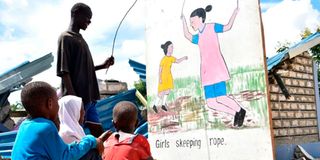Why the GPE Summit is about more than donor funds

Bonje Pefa nursery pupils have their lesson outside on May 10 after their school was demolished. The Global Partnership for Education seeks to ensure every child gets a decent and equitable education.
The Global Partnership for Education (GPE) financing summit scheduled to take place on July 28 and 29 will focus on the gap in education funding around the world.
The GPE estimates that the annual gap between what is spent now and what needs to be spent to achieve quality education for all stands at nearly $200 billion. The difference is made bigger by the devastating impact of the Covid-19 pandemic on countries’ economies.
The goal of raising at least $5 billion over the next five years in donor pledges to spend on global education may be the solution to lack of investment in education.
Domestic financing constitutes the lion’s share of resources to education in GPE partner countries. More than two-thirds of education resources come from domestic public expenditure. This has long been recognised by African leaders and is why domestic financing is key in the GPE’s Raise Your Hand Campaign.
President Uhuru Kenyatta, who is co-hosting the global Summit, is leading the call for GPE partner countries to prioritise investing their own money in educating their own youth.
President Kenyatta has called for African governments to protect domestic education budgets to create more prosperous and resilient economies and ensure that the momentum on education is not lost because of the Covid-19 pandemic.
Self-reliance
Other African leaders have emphasised the need for national self-reliance and accountability. President Nana Akufo-Addo of Ghana told a GPE replenishment in Dakar, Senegal, that Africans could not depend on others to finance the education of their continent.
In February this year, at the African Union Leaders’ Summit, President Julius Maada Bio of Sierra Leone had a similar message for his fellow leaders; they had to be accountable for protecting education budgets.
But changing learning outcomes for African children requires something more fundamental than investment. It requires local leadership.
The World Bank estimates up to one-third of education spending is lost to inefficiencies such as low levels of learning, high repetition rates, waste in procurement, and poor education workforce management. For decades, progress was measured by inputs not outcomes.
Even where local leaders are galvanised by the need to use their education budgets effectively, systemic challenges in low infrastructure, capacity and resource environments are hard.
Much can be done by making sure that every existing cent already being spent is spent well; but effectively tackling the challenges in many education systems needs more than additional dollars. It needs strong political will and the determination to deliver results by challenging and reforming what is measurably not working.
Transformational change
One example of this is the EdoBEST basic education programme in Edo State, Nigeria, where NewGlobe supports the state education board in delivering transformational change across more than 1,000 public primary schools.
It has just celebrated its third anniversary, having been praised by the World Bank, which calls EdoBEST a great example for other states in Nigeria and even other countries to follow.
Edo’s Governor, Godwin Obaseki, told CNBC Africa recently that the local political desire to change learning outcomes, in order to drive wider development, had been crucial.
Commitment
Mr Obaseki said that for a reform process like EdoBEST to be a success, political leaders have to take on this kind of reform.
They have to show commitment and leadership which are key for investment. EdoBEST educational transformation became a political priority because the breakdown of the education system had left young people.
This led to thousands of young boys and girls to undertake perilous trips across the Sahara in the hope of reaching Europe and a brighter future. An ineffective education system and lack of investment was not just depriving children of their rights and undermining long-term economic prosperity - it was undermining the very fabric of society.
Three years since inception, EdoBEST has achieved stunning results as 70 per cent of children under the programme are now learning at the same rate of their counterparts in Europe and Asia.
Accelerator Programme
That same review of the average situation in Nigerian schools measured them at about 30 per cent. It took countries like Singapore, like South Korea two to three decades to achieve such speeds.
The programme has attracted tens of millions of dollars of additional funding from the World Bank, as one of its “Accelerator Programme” investments in Africa - along with Kenya, Morocco, Mozambique, Niger, Rwanda and Sierra Leone picked out for additional support because of their ability to “demonstrate strong political and financial commitment to improved learning.”
The World Bank’s Education Director, Jaime Saavedra, set out a clear case for why political leaders must prioritise educational transformation using EdoBEST as a model pointing out that investing in human capital in the education of children is not only critical for their welfare and well-being but also instrumental in fostering innovation and long-term growth and development.
African leaders are increasingly leading education programmes designed and financed by their own governments, unlocking new opportunities domestically and internationally through their leadership.
It is the recognition of this emerging shift coupled with the huge societal gains from transforming education which is driving President Kenyatta’s clarion call for all African leaders at this forthcoming GPE summit.
Reuben Wambugu is the Managing Director, Bridge Kenya





